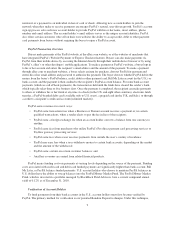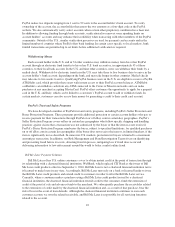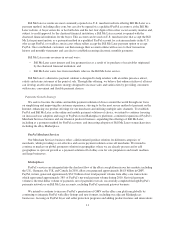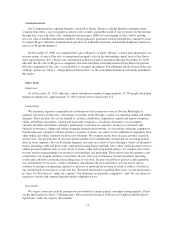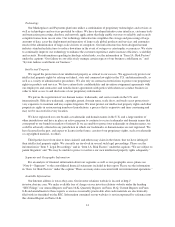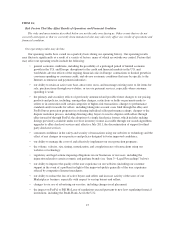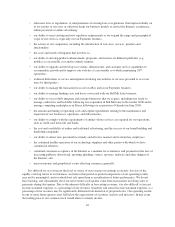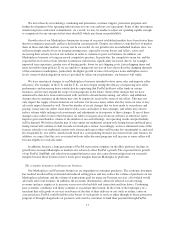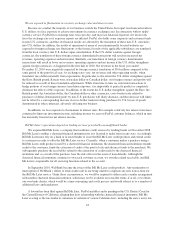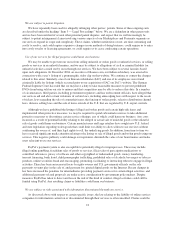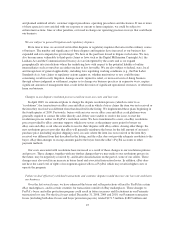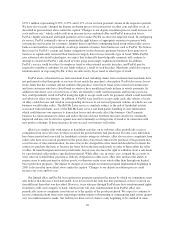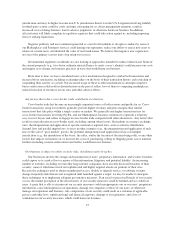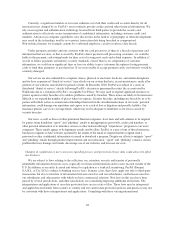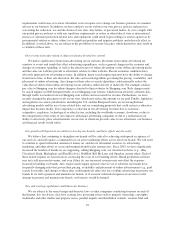eBay 2010 Annual Report Download - page 24
Download and view the complete annual report
Please find page 24 of the 2010 eBay annual report below. You can navigate through the pages in the report by either clicking on the pages listed below, or by using the keyword search tool below to find specific information within the annual report.The court dismissed the usury claims in December 2010, but breach of contract and other claims remain. We
believe that these allegations are without merit and intend to defend ourselves vigorously. However, this area of law
is uncertain and if the lawsuit is successful, Bill Me Later may be required to change its methods of operations, pay
substantial damages and reduce some of its charges and fees, which would likely adversely affect our business.
If our Payments business is found to be subject to or in violation of any laws or regulations, including those
governing money transmission, electronic funds transfers, money laundering, counter-terrorist financing,
banking and lending, it could be subject to liability, licensure and regulatory approval and may be forced to
change its business practices.
While PayPal currently allows its customers with credit cards to send payments from 190 markets, PayPal
only allows customers in 74 of those markets (including the U.S.) to receive payments, in some cases with
significant restrictions on the manner in which customers can withdraw funds. These limitations may affect
PayPal’s ability to grow in these markets.
Of the 190 markets whose residents can use the PayPal service, 31 (27 countries plus four French overseas
departments) are members of the European Union , or EU. Since 2007, PayPal has provided localized versions of its
service to customers in the EU through PayPal (Europe) S.A.R.L. et Cie, SCA, a wholly-owned subsidiary of
PayPal that is licensed and subject to regulation as a bank in Luxembourg. Accordingly, PayPal (Europe) is subject
to significant fines or other enforcement action if it violates the disclosure, reporting, anti-money laundering,
capitalization, funds management, corporate governance or other requirements imposed on Luxembourg banks.
PayPal has limited experience in operating as a bank, and any fines or other enforcement actions imposed by the
Luxembourg regulator could adversely affect PayPal’s business. PayPal (Europe) implements its localized services
in EU countries through a “passport” notification process through the Luxembourg regulator to regulators in other
EU member states pursuant to EU Directives, and has completed the “passport” notice process in all EU member
countries. The regulators in these countries could notify PayPal (Europe) of local consumer protection laws that will
apply to its business, in addition to Luxembourg consumer protection law, and could also seek to persuade the
Luxembourg regulator to order PayPal (Europe) to conduct its activities in the local country through a branch office.
These or similar actions by these regulators could increase the cost of, or delay, PayPal’s plans for expanding its
business in EU countries. In addition, the EU Payments Service Directive, which established a new regulatory
regime for payment services providers, formally took effect in November 2009. The interpretation of regulations
implementing the EU Payments Service Directive remains uncertain.
In Australia, PayPal serves its customers through PayPal Australia Pty. Ltd., which is licensed by the
Australian Prudential Regulatory Authority as a purchased payment facility provider, which is a type of
authorized depository institution. Accordingly, PayPal Australia is subject to significant fines or other
enforcement action if it violates the disclosure, reporting, anti-money laundering, capitalization, corporate
governance or other requirements imposed on Australian depository institutions. In China, PayPal is affiliated
with Shanghai Wangfuyi Information Technology Ltd., which is licensed as an Internet Content Provider and
operates a payments service only for Chinese customers and only for transactions denominated in Chinese
currency. The People’s Bank of China (PBOC) has recently enacted regulations to establish a new type of
license, called a Payment Settlement Organization (PSO) license, which will be required for non-bank payment
services. The PBOC regulations leave unclear whether a foreign-owned company such as PayPal can control or
invest in a Payment Settlement Organization, and whether Wangfuyi would be eligible to obtain a PSO license.
To date, PayPal has obtained licenses to operate as a money transmitter in 42 U.S. states and territories and
interpretations in seven states that licensing is not required under their existing statutes. The remaining U.S. state
and territories do not currently regulate money transmitters. As a licensed money transmitter, PayPal is subject to
restrictions on its investment of customer funds, reporting requirements, bonding requirements, and inspection by
state regulatory agencies. If PayPal were found to be in violation of money services laws or regulations, PayPal
could be subject to liability, forced to cease doing business with residents of certain states, forced to change its
business practices, or required to obtain additional licenses or regulatory approvals that could impose a
19


